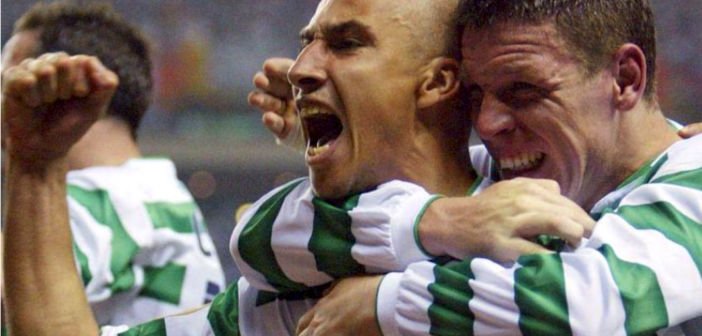TODAY marks the twentieth anniversary of Celtic’s unforgettable May 21 2003 evening in the Spanish city of Seville.
It was an occasion where Martin O’Neill’s team were fated to lose to their opponents in a breathtaking UEFA Cup finale during a dramatic extra-time confrontation.
The adventure turned into a celebration for the wonderful Hoops support, lauded throughout the world for their behaviour, even in defeat.
Author Alex Gordon vividly captures the setting of a colourful episode in the club’s glorious history.
Over the next five days, in another CQN EXCLUSIVE, Alex presents the entire chapter devoted to the momentous European run in his tribute publication, ‘The Winds of Change‘, published by CQN in 2015.
Please enjoy a walk down memory lane.
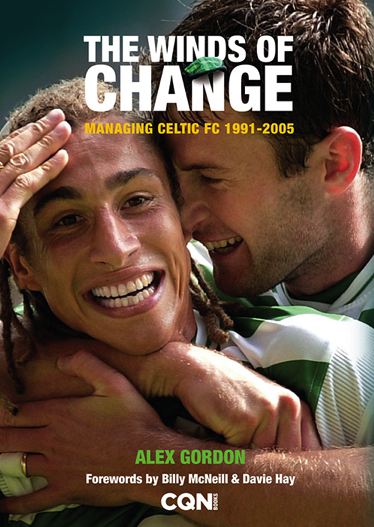
THERE is such a thing as glorious failure. There could only be one winner in Seville on the epic evening of May 21 2003 in the most dramatic of UEFA Cup Finals and the fates decreed, alas, the ultimate destination of the glistening trophy would not be the east end of Glasgow.
The most extraordinary and colourful support in the world of football staged a friendly invasion on the Spanish city as they looked forward with unprecedented enthusiasm to the meeting of Martin O’Neill’s Celtic and Jose Mourinho’s Porto at the vast arena of the Olimpico Stadium where the official attendance would be given as 52,972.
Days before the kick-off, there were estimates of between 80,000 and 100,000 Celtic supporters in the capital of southern Spain’s Andalusia region. Over 30,000 followers are thought to have been in the ground.
Vivid, brilliant sunbeams smiled on the sparkling setting of gaiety and merriment. The blazing greens and the whites and the golds that fluttered in the welcome breeze and adorned the stadium hours before the commencement of the contest added to the breathtaking kaleidoscopic scenery. The Portuguese supporters contributed, too, with their blue and white flags prominent in their designated areas.
But the Olimpico Stadium belonged to Celtic supporters the moment Paul Lambert led out the team with the knowledge they were one game away from the club winning their second European trophy, adding to the spectacular success of the Lisbon Lions 36 years earlier.
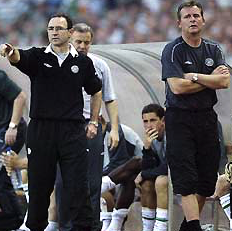
THREE WISE MEN…Martin O’Neill with his assistants John Robertson and Steve Walford on the touchline of the Olimpico Stadium in Seville.
With painstaking precision, Martin O’Neill, as ever, had agonised over his final selection. The strengths and weaknesses of all the players at his disposal would be pored over time and time again. The Irishman was rarely given to spontaneity in such circumstances. He worked overtime on his strategies, especially in the competitive European arena.
Celtic had played twelve games to reach this terminus. The challenges of FK Sudova, Blackburn Rovers, Celta Vigo, Stuttgart, Liverpool and Boavista had been met and answered, all interrogations of Celtic’s ability repelled. The ultimate prize was now within touching distance.
And, yet, at some stages of the colourful procession towards Seville, there were critics only too willing to write off O’Neill and his players; mainly, unsurprisingly, from across the border, principally Blackburn and Liverpool.
Celtic only featured in the UEFA Cup after failing to manoeuvre their way past Basle in the Champions League Third Round qualifier. The entire European campaign got off to a shocker when the Swiss side scored after only 81 SECONDS at Parkhead on August 14 in front of a stunned crowd of 58,530.
Joos Valgaeren failed to cut out a through ball from Julio Rossi that ran to Christian Gimenez and the Argentinian striker made a mess of his shot. But it was enough to leave Rab Douglas flat-footed as it rolled gently towards the net.
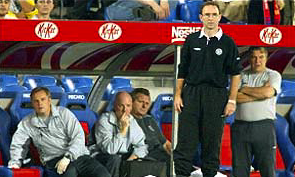
SWISS MISS…Martin O’Neill and his backroom staff watch as Celtic lose to Basle and head through the Champions League exit.
Within two minutes, the Scottish champions were level when Henrik Larsson thumped home a penalty-kick after Stiliyan Petrov had been felled in the box by Marco Zwyssig. Six minutes after the interval, Neil Lennon tried his luck from 30 yards and Chris Sutton spotted keeper Pasacl Zuberbuhler moving to his right to deal with the danger. Instinctively, he shot out his foot and directed the ball into the other corner.
Larsson spurned the chance to claim a third in the 63rd minute when Spanish referee Manuel Gonzalez awarded another spot-kick after Murat Yakin’s handball. The Swede drove the ball down the middle and the keeper scrambled it to safety. Two minutes from time, Momo Sylla volleyed in the third from a Steve Guppy cross to allay some of the anxiety.
Thirteen days later, the Champions League trip was over, Celtic losing 2-0 at the St. Jakob Stadium to go out on the goals away rule. Gimenez and Yakin struck in the first 22 minutes to extinguish any hopes of the club picking up the welcome £15million bounty that came with qualification to the group stages.
O’Neill said, ‘I’m obviously very disappointed, but we didn’t play well enough in the first-half. In the second-half, we threw everything at them, but it wasn’t to be. Now we will see what happens in the UEFA Cup.’
Celtic cleared the first hurdle with effortless ease, winning 8-1 at home against the earnest Lithuanians of FK Suduva in the first leg and 2-0 in the return. It was deemed fitting Henrik Larsson should score the first goal in the run to the Final when he netted in 16 minutes.
Before half-an-hour had passed, the Swede had collected a hat-trick and, in doing so, hoisted himself level with Ally McCoist on the European record of 21 goals. He would render the Rangers player’s feat obsolete in the next round.
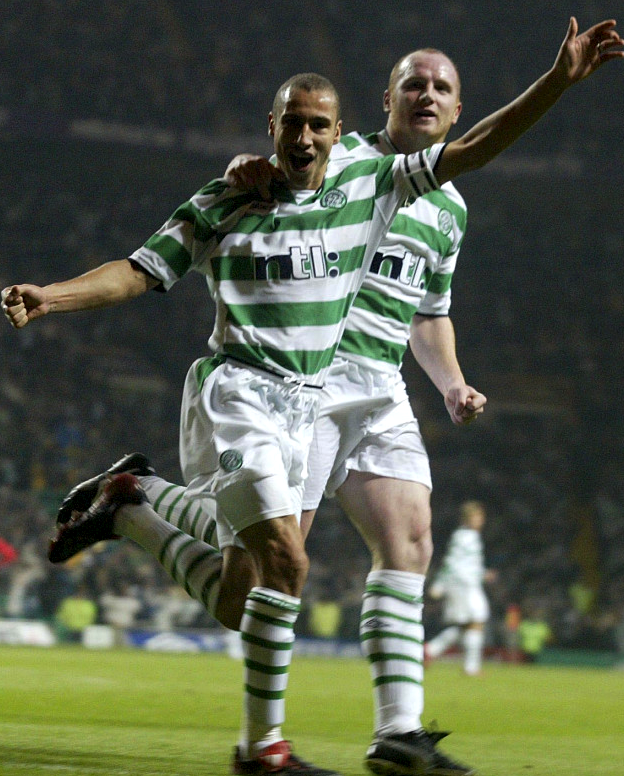
HOORAY HENRIK…John Hartson congratulates Henrik Larsson after the Swede had opened the scoring in the 8-1 landslide win over FK Sudova at the beginning of the UEFA Cup adventure.
O’Neill’s men were coasting in Glasgow against opponents who appeared to appreciate the guile and expertise of the Scottish team. Stiliyan Petrov and Chris Sutton scored to make it 5-0 at the interval and Paul Lambert, John Hartson and Joos Valgaeren chipped in to take the score to 8-0 with a minute to go.
The fans wondered if Celtic could match their all-time best of 9-0 against the Finns of Kokkola in 1970, but a mistake by Rab Douglas, with a sloppy pass, cost the side a goal, Tomas Radinevicius claiming the consolation.
It was chilly and overcast in the second leg, but Davide Fernandez, the Spaniard making a rare appearance, got the opener in the 12th minute and Alan Thompson added a second before half-time.
The game was played at walking pace in the second period, but Didier Agathe decided to illuminate proceedings with an eye-catching slalom run down the right touchline while beating five defenders in a mazy, solo surge into the penalty area.
Unfortunately, he didn’t get past a sixth opponent who flattened him. John Hartson might have made a better attempt with the resultant spot-kick to, at least, give his team-mate some sort of consolation, but, alas, the Welshman’s weak effort from 12 yards didn’t even hit the target.
As the luck of the draw would have it, Graeme Souness and his Blackburn Rovers team were the next obstacle to be placed in Celtic’s path.
The former Rangers manager grimaced when he heard the ballot and, in a moment of light-hearted badinage, quipped, ‘I’ll need to look out the old tin helmet for Parkhead.’
* TOMORROW: Don’t miss The Road to Seville Part Two

